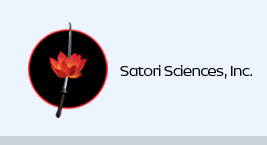February 2007
Message from Nicole Grace
Victory Is Now
The [Native American] warrior's attitude was to live life fearlessly as though each day was his last. Before every battle he'd say, 'This is a good day to die.' So, whether I'm coaching or tending a garden or chopping wood or whatever, I'm going to live this life to its fullest and this day to its fullest." - Phil Jackson1
Bob Hurley, a high-school basketball coach from New Jersey, was just nominated to be inducted into the (national) Basketball Hall of Fame. If he is voted in, he will be one of only 2 other high school coaches to receive this honor. His philosophy? "...just being a coach. Just being in the present." Like celebrated Bulls coach Phil Jackson, another Zen-minded basketball sage, Hurley doesn't seem interested in achieving some future glory. He's just focused on the game. Whatever that game is in any moment.Hurley told a reporter for the New York Times, "There's no shortcut to success. If you shortcut in practice, there's no success in the game."2 This may sound like a different piece of advice than "being in the present," but actually, it reflects the same wise approach to winning in any arena.
If you're totally focused on bringing the best of yourself to every moment, and not wasting energy projecting your attention towards some dream of the future, then you will understand the wisdom of not taking shortcuts in practice.In each moment of life all future reality is created. Putting in 50% of your effort now will inevitably create an outcome that reflects just 50% of your potential. Putting in 100% of your effort now will create the best outcome possible. Not only that, whether you won or lost a game or whether you achieved a particular goal, if you gave 100% effort then you can be proud of your performance. More importantly, when the future comes, you will have evolved in a way that could only have been achieved by working continuously at your peak potential.
When Hurley returned home one day after coaching his high school students, his wife asked him, "Anything happen today?" He commented on a few details about practice that afternoon. She said, "Weren't you nominated for the Hall of Fame?" He laughed, "Oh, yeah." Hurley had spent the day engaged in his work, focusing on his students, working on their game. If, instead, he had just been going through the motions of coaching while he was lost in dreaming about being inducted into the Hall of Fame, it would have been a very different day for him, and for his students.
People often assume that living in the present means not having intent or motivation. That you can't focus on "now" and still set meaningful goals. This is a misunderstanding. You absolutely continue to set goals for yourself. The key is not to focus on the end result once you have set the goal. Once you know where you want to end up and you have determined how to get there, all that you need to do is concentrate on each step of the way. Then, the journey will take care of itself and, one day, you'll realize that you have not only achieved the goal you set, but in all likelihood you will have surpassed it. You'll just find that you were so engaged in your Work that you forgot to measure every step, and you were too busy achieving your goal to stop to pat yourself on the back.
Alternatively, if you had continued to spend time and energy dreaming about your end goal, your day-to-day focus would have lapsed. You might have gotten lost in distracting emotional tangents, such as feeling fear about the future, anxiety about whether you would succeed in achieving your goal, or despair if you sensed you were not as close as you thought you should be at any given point along the way.
Being in the present is a far more efficient, peaceful and happy way to live and work.
We have all heard the sports metaphor, "Keep your eye on the ball." But most people misunderstand what this means. It does not mean, "Keep your eye on the end goal." But rather, "Stay focused on your immediate game." If you take the analogy literally, using the example of baseball or tennis, the athlete must keep his eye on the ball or he will not hit it at its most profitable trajectory, with the bat or the racquet. The expression does not suggest that an athlete keep his focus on winning the game, but that he should focus on every swing.
Dreaming about some future outcome is unproductive at best. At worst, it's limiting and dispiriting. We should not be motivated by the transient accolades that derive from winning a trophy, but by the more lasting and significant recognition that we give to ourselves through self-respect and self-worth. By driving ourselves to excel in every moment, working at our peak capacity and with whole-hearted devotion to any task, we earn the greatest and richest rewards. Rewards that no one has the power to bestow on anyone else: dignity, self-worth and even, glory.
True glory is not delivered unto us by others, but by God. And that can only be earned and perceived through the heart of each individual looking - not out at the world and at some material goal - but inward, at the heart and the soul.
Ultimately, living in the present means living with acute awareness and appreciation of our immediate circumstances and actions. This is the way to realize, not just success, but inner power, peace and everlasting joy. Victory is not something that may or may not happen in the future. If we can learn to live wholly in the present, victory is achieved now.
Nicole Grace February 2007"Trust no Future, howe'er pleasant! Let the dead Past bury its dead! Act—act in the living Present! Heart within, and God o'erhead. Lives of great men all remind us We can make our lives sublime, And, departing, leave behind us Footprints on the sands of time; Let us, then, be up and doing, With a heart for any fate; Still achieving, still pursuing, Learn to labour and to wait."
- Henry Wadsworth Longfellow, "In the Living Present"
1No More Bull, by Charlie Rosen. Published in Cigar Aficionado, September/October 1998. 2A Coach Who Likes Just Being in the Present, by Dave Anderson. Published in the New York Times, February 22, 2007.


